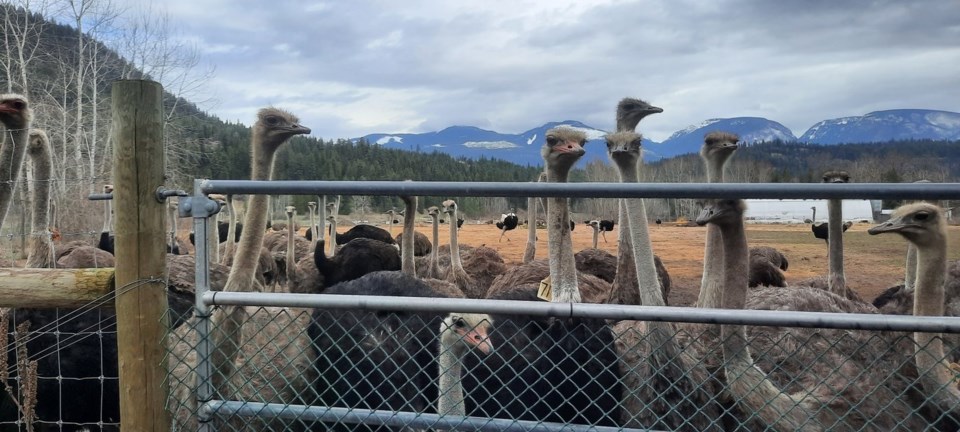Conservative MP Scott Anderson says he's trying to stop the Canadian Food Inspection Agency from killing a flock of hundreds of ostriches on a farm in his riding, after a Federal Court ruling this week that the cull could proceed.
Anderson said that he visited Universal Ostrich Farm in Edgewood in southeast B.C. on Wednesday and the family that owns the birds is "quite devastated" at the prospect of the flock of about 400 birds being killed over concerns about avian flu.
"It's kind of a heartbreaking situation for them," Anderson said Thursday.
He said the case has caused widespread fear in the animal husbandry industry over worries that the federal agency can come in and cull every animal on a farm "including in some cases cats and dogs."
Dozens of people have gathered at the farm, whose owner, Karen Espersen, has called for supporters to surround the property to block the cull by the agency, which has said it will not publicize the dates of the operations.
Videos and photos posted on social media show dozens of people, tents, caravans and vehicles on the property, with fences draped in flags and banners.
Anderson said he visited the farm earlier this year, and there's now a greater sense of "trepidation" over the impending cull since Tuesday's ruling.
He said he was going to ask the agency to "hold off" on the cull because there's a possibility of setting up a research facility on the property with the backing of academics.
The owners have said the birds have developed herd immunity to avian flu since the outbreak was detected late last year, and that the live ostriches are valuable for research.
"We'll see where that goes," Anderson said.
He said he spoke to the farmers briefly on Wednesday but didn't engage with a crowd that has gathered.
"I just told them that I'm doing what I can to forestall the cull," he said. "As far as I can tell, they're healthy birds."
He said that the Federal Court judge "understandably" didn't want to weigh in on the science behind the decision to kill the flock because he's not a scientist. But he said the owners faced "devastation" on both an emotional and practical level if they lost the decades-old flock.
He said he would offer to act as an "interface" between scientists who have come out against the cull to explore alternatives, but he didn't visit the farm out of opposition.
"These people are constituents of mine and they deserve my help," he said. This is an issue that involves constituents, and it obviously has broader implications than simply this farm."
A meeting of the Regional District of Central Kootenay on Thursday was attended by about 300 people online, many objecting to the cull.
Officials and staff were asked why the district wasn’t trying to halt the cull or the disposal of the carcasses at a district landfill, while others suggested the avian flu virus does not exist and the need for the cull was fraudulent.
District vice-chairman Aiden McLaren-Caux said the prospect of the cull was “horrifying,” but the district “would likely have little legal standing” to refuse to accept the carcasses at the landfill.
“We can say what we want (to the Canadian Food Inspection Agency). They don’t have to listen to us,” he said.
Uli Wolf, the district’s general manager of environmental services, said the district had been told to expect 50 to 75 tonnes of waste as a result of the cull but this was not a “significant increase to the organic loading” of the landfill and therefore presented no additional health risk.
Katie Pasitney, whose parents own the farm, attended the meeting in person and said the district should refuse to accept the carcasses of the ostriches “that hold way more value alive than they do dead.”
“Our animals are happy, they’re healthy, they’re laying eggs, they’re beautiful,” she said.
The Canadian Food Inspection Agency has defended its decision to proceed with the cull, saying on Wednesday that allowing a domestic flock "known to be exposed to highly pathogenic avian influenza to remain alive allows a potential source of the virus to persist."
Lawyers who represented the farm in the case did not respond to a request for comment.
This report by The Canadian Press was first published May 15, 2025.
Darryl Greer, The Canadian Press



